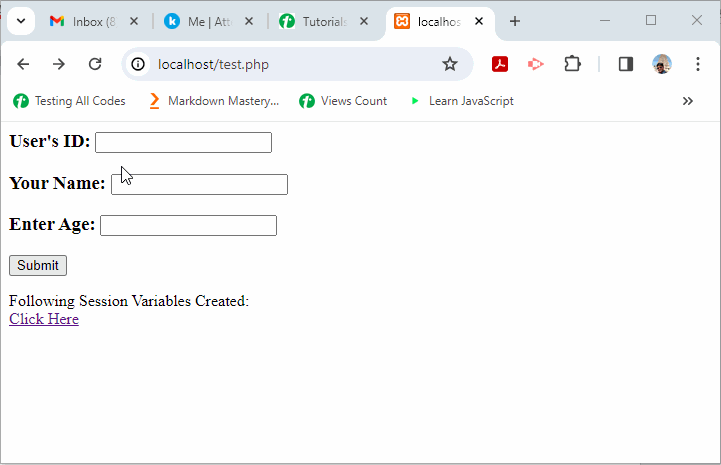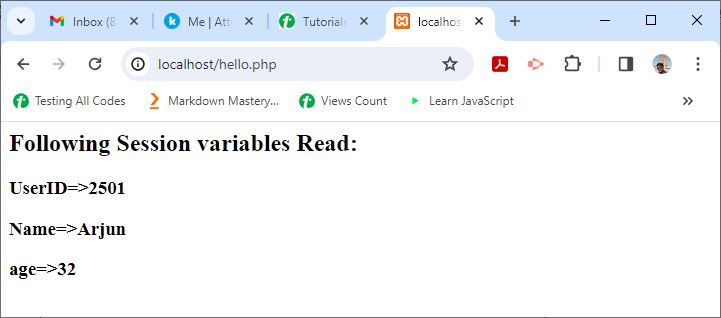
- PHP Tutorial
- PHP - Home
- PHP - Introduction
- PHP - Installation
- PHP - History
- PHP - Features
- PHP - Syntax
- PHP - Hello World
- PHP - Comments
- PHP - Variables
- PHP - Echo/Print
- PHP - var_dump
- PHP - $ and $$ Variables
- PHP - Constants
- PHP - Magic Constants
- PHP - Data Types
- PHP - Type Casting
- PHP - Type Juggling
- PHP - Strings
- PHP - Boolean
- PHP - Integers
- PHP - Files & I/O
- PHP - Maths Functions
- PHP - Heredoc & Nowdoc
- PHP - Compound Types
- PHP - File Include
- PHP - Date & Time
- PHP - Scalar Type Declarations
- PHP - Return Type Declarations
- PHP Operators
- PHP - Operators
- PHP - Arithmatic Operators
- PHP - Comparison Operators
- PHP - Logical Operators
- PHP - Assignment Operators
- PHP - String Operators
- PHP - Array Operators
- PHP - Conditional Operators
- PHP - Spread Operator
- PHP - Null Coalescing Operator
- PHP - Spaceship Operator
- PHP Control Statements
- PHP - Decision Making
- PHP - If…Else Statement
- PHP - Switch Statement
- PHP - Loop Types
- PHP - For Loop
- PHP - Foreach Loop
- PHP - While Loop
- PHP - Do…While Loop
- PHP - Break Statement
- PHP - Continue Statement
- PHP Arrays
- PHP - Arrays
- PHP - Indexed Array
- PHP - Associative Array
- PHP - Multidimensional Array
- PHP - Array Functions
- PHP - Constant Arrays
- PHP Functions
- PHP - Functions
- PHP - Function Parameters
- PHP - Call by value
- PHP - Call by Reference
- PHP - Default Arguments
- PHP - Named Arguments
- PHP - Variable Arguments
- PHP - Returning Values
- PHP - Passing Functions
- PHP - Recursive Functions
- PHP - Type Hints
- PHP - Variable Scope
- PHP - Strict Typing
- PHP - Anonymous Functions
- PHP - Arrow Functions
- PHP - Variable Functions
- PHP - Local Variables
- PHP - Global Variables
- PHP Superglobals
- PHP - Superglobals
- PHP - $GLOBALS
- PHP - $_SERVER
- PHP - $_REQUEST
- PHP - $_POST
- PHP - $_GET
- PHP - $_FILES
- PHP - $_ENV
- PHP - $_COOKIE
- PHP - $_SESSION
- PHP File Handling
- PHP - File Handling
- PHP - Open File
- PHP - Read File
- PHP - Write File
- PHP - File Existence
- PHP - Download File
- PHP - Copy File
- PHP - Append File
- PHP - Delete File
- PHP - Handle CSV File
- PHP - File Permissions
- PHP - Create Directory
- PHP - Listing Files
- Object Oriented PHP
- PHP - Object Oriented Programming
- PHP - Classes and Objects
- PHP - Constructor and Destructor
- PHP - Access Modifiers
- PHP - Inheritance
- PHP - Class Constants
- PHP - Abstract Classes
- PHP - Interfaces
- PHP - Traits
- PHP - Static Methods
- PHP - Static Properties
- PHP - Namespaces
- PHP - Object Iteration
- PHP - Encapsulation
- PHP - Final Keyword
- PHP - Overloading
- PHP - Cloning Objects
- PHP - Anonymous Classes
- PHP Web Development
- PHP - Web Concepts
- PHP - Form Handling
- PHP - Form Validation
- PHP - Form Email/URL
- PHP - Complete Form
- PHP - File Inclusion
- PHP - GET & POST
- PHP - File Uploading
- PHP - Cookies
- PHP - Sessions
- PHP - Session Options
- PHP - Sending Emails
- PHP - Sanitize Input
- PHP - Post-Redirect-Get (PRG)
- PHP - Flash Messages
- PHP AJAX
- PHP - AJAX Introduction
- PHP - AJAX Search
- PHP - AJAX XML Parser
- PHP - AJAX Auto Complete Search
- PHP - AJAX RSS Feed Example
- PHP XML
- PHP - XML Introduction
- PHP - Simple XML Parser
- PHP - SAX Parser Example
- PHP - DOM Parser Example
- PHP Login Example
- PHP - Login Example
- PHP - Facebook Login
- PHP - Paypal Integration
- PHP - MySQL Login
- PHP Advanced
- PHP - MySQL
- PHP.INI File Configuration
- PHP - Array Destructuring
- PHP - Coding Standard
- PHP - Regular Expression
- PHP - Error Handling
- PHP - Try…Catch
- PHP - Bugs Debugging
- PHP - For C Developers
- PHP - For PERL Developers
- PHP - Frameworks
- PHP - Core PHP vs Frame Works
- PHP - Design Patterns
- PHP - Filters
- PHP - JSON
- PHP - Exceptions
- PHP - Special Types
- PHP - Hashing
- PHP - Encryption
- PHP - is_null() Function
- PHP - System Calls
- PHP - HTTP Authentication
- PHP - Swapping Variables
- PHP - Closure::call()
- PHP - Filtered unserialize()
- PHP - IntlChar
- PHP - CSPRNG
- PHP - Expectations
- PHP - Use Statement
- PHP - Integer Division
- PHP - Deprecated Features
- PHP - Removed Extensions & SAPIs
- PHP - PEAR
- PHP - CSRF
- PHP - FastCGI Process
- PHP - PDO Extension
- PHP - Built-In Functions
- PHP Useful Resources
- PHP - Questions & Answers
- PHP - Quick Guide
- PHP - Useful Resources
- PHP - Discussion
PHP - $_SESSION
One of the superglobal variables in PHP, $_SESSION is an associative array of session variables available in the current script. $HTTP_SESSION_VARS also contains the same information, but it is not a superglobal, and it has now been deprecated.
What is a Session?
A Session is an alternative way to make data accessible across the pages of an entire website. It is the time duration between the time a user establishes a connection with a server and the time the connection is terminated. During this interval, the user may navigate to different pages. Many times, it is desired that some data is persistently available across the pages. This is facilitated by session variables.
A session creates a file in a temporary directory on the server where the registered session variables and their values are stored. This data will be available to all the pages on the site during that visit.
The server assigns a unique SESSIONID to each session. Since HTTP is a stateless protocol, data in session variables is automatically deleted when the session is terminated.
The session_start() Function
In order to enable access to session data, the session_start() function must be invoked. session_start() creates a session or resumes the current one based on a session identifier passed via a GET or POST request, or passed via a cookie.
session_start(array $options = []): bool
This function returns true if a session was successfully started, else it returns false.
Handling Session Variables
To create a new session variable, add a key-value pair in the $_SESSION array −
$_SESSION[ "var"]=value;
To read back the value of a session variable, you can use echo/print statements, or var_dump() or print_r() functions.
echo $_SESSION[ "var"];
To obtain the list of all the session variables in the current session, you can use a foreach loop to traverse the $_SESSION −
foreach ($_SESSION as $key=>$val) echo $key . "=>" . $val;
To manually clear all the session data, there is session_destroy() function. A specific session variable may also be released by calling the unset() function.
unset($_SESSION[ "var"]);
List of Session Functions
In PHP, there are many built-in functions for managing the session data.
| Session Functions | Description |
|---|---|
| session_abort | Discard session array changes and finish session |
| session_cache_expire | Return current cache expire |
| session_cache_limiter | Get and/or set the current cache limiter |
| session_commit | Alias of session_write_close |
| session_create_id | Create new session id |
| session_decode | Decodes session data from a session encoded string |
| session_destroy | Destroys all data registered to a session |
| session_encode | Encodes the current session data as a session encoded string |
| session_gc | Perform session data garbage collection |
| session_get_cookie_params | Get the session cookie parameters |
| session_id | Get and/or set the current session id |
| session_is_registered | Find out whether a global variable is registered in a session |
| session_module_name | Get and/or set the current session module |
| session_name | Get and/or set the current session name |
| session_regenerate_id | Update the current session id with a newly generated one |
| session_register_shutdown | Session shutdown function |
| session_register | Register one or more global variables with the current session |
| session_reset | Re-initialize session array with original values |
| session_save_path | Get and/or set the current session save path |
| session_set_cookie_params | Set the session cookie parameters |
session_set_save_handler |
Sets user-level session storage functions |
| session_start | Start new or resume existing session |
| session_status | Returns the current session status |
| session_unregister | Unregister a global variable from the current session |
| session_unset | Free all session variables |
| session_write_close | Write session data and end session |
Example
The following PHP script renders an HTML form. The form data is used to create three session variables. A hyperlink takes the browser to another page, which reads back the session variables.
Save this code as "test.php" in the document root folder, and open it in a client browser. Enter the data and press the Submit button.
<html>
<body>
<form action="<?php echo $_SERVER['PHP_SELF'];?>" method="post">
<h3>User's ID: <input type="text" name="ID"/></h3>
<h3>Your Name: <input type="text" name="name"/></h3>
<h3>Enter Age: <input type="text" name="age"/></h3>
<input type="submit" value="Submit"/>
</form>
<?php
session_start();
if ($_SERVER["REQUEST_METHOD"] == "POST") {
$_SESSION['UserID'] = $_POST['ID'];
$_SESSION['Name'] = $_POST['name'];
$_SESSION['age'] = $_POST['age'];
}
echo "Following Session Variables Created: \n";
foreach ($_SESSION as $key=>$val)
echo "<h3>" . $key . "=>" . $val . "</h3>";
echo "<br/>" . '<a href="hello.php">Click Here</a>';
?>
</body>
</html>
When you click the "Submit" button, it will show a list of all the session variables created −

Next, have the following script in the "hello.php" file and save it.
<?php session_start(); echo "<h2>Following Session variables Read:</h2>"; foreach ($_SESSION as $key=>$val) echo "<h3>" . $key . "=>" . $val . "</h3>"; ?>
Now, follow the link on the "test.php" page to navigate to "hello.php". It will show the session variables that are read −

